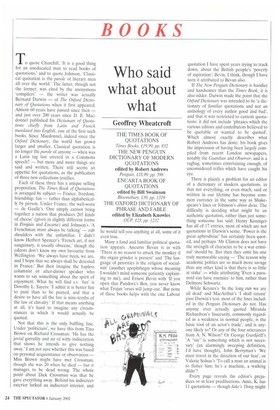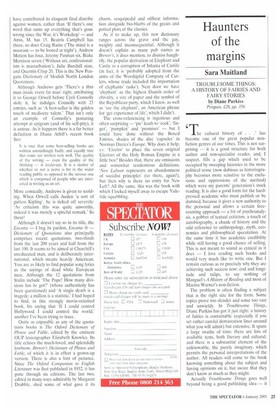Who said what about what
Geoffrey Wheatcroft
THE TIMES BOOK OF QUOTATIONS
Times Books, £19.99, pp. 832
THE NEW PENGUIN DICTIONARY OF MODERN QUOTATIONS edited by Robert Andrews
Penguin, £18.99, pp. 598
ENCARTA BOOK OF QUOTATIONS edited by Bill Swainson
Bloomsbury', £30, pp. 1319
THE OXFORD DICTIONARY OF PHRASE AND FABLE edited by Elizabeth Knowles
OUP, £25, pp. 1232
To quote Churchill, 'It is a good thing for an uneducated man to read books of quotations,' and to quote Johnson, 'Classical quotation is the parole of literary men all over the world.' The latter, though not the former. was cited by the anonymous 'compilers' — the writer was actually Bernard Darwin — of The Oxford Dictionary of Quotations when it first appeared. Almost 60 years have passed since then — and just over 200 years since D. E. Macdonnel published his Dictionary of Quotations chiefly from Latin and French translated into English, one of the first such books. Since Macdonnel, indeed since the Oxford Dictionary, the world has grown larger and smaller. Classical quotation is no longer the parole of anyone — when was a Latin tag last uttered in a Commons speech? — but more and more things are said and written. There still seems an appetite for quotations, as the publication of three new collections testifies.
Each of these three has a unique selling proposition. The Times Book of Quotations is arranged by subject — France, freedom, friendship. fun — rather than alphabetically by person. Under Francc, the well-worn — de Gaulle's 'One simply cannot bring together a nation that produces 265 kinds of cheese' (given in slightly different forms in Penguin and Encarta) and Johnson's 'A Frenchman must always be talking' — rub shoulders with the unfamiliar. I didn't know Herbert Spencer's 'French art, if not sanguinary, is usually obscene,' though the editors don't know my own favourite from Wellington: 'We always have been, we are, and I hope that we always shall be detested in France.' But then imagine the hapless columnist or after-dinner speaker who wants to say something about the spirit of enjoyment. What he will find s.v. `fun' is Dorothy L. Sayers: 'I admit it is better fun to punt than to be punted, and that a desire to have all the fun is nine-tenths of the law of chivalry.' If that means anything at all, it's hard to imagine any circumstances in which it would actually be quoted.
Not that this is the only baffling line. Under 'politicians', we have this from Tina Brown on Richard Crossman: 'He has the jovial garrulity and air of witty indiscretion that shows he intends to give nothing away.' I am not sure whether this was based on personal acquaintance or observation — Miss Brown might have met Crossman. though she was 20 when he died — but it manages to be dead wrong. The whole point about Dick Crossman was that he gave everything away. Behind his indiscreet exterior lurked an indiscreet interior, and he would tell you anything at all, some of it even true.
Many a fond and familiar political quotation appears. Ancurin Bevan is in with 'There is no reason to attack the monkey if the organ grinder is present' and The language of priorities is the religion of socialism' (another apophthegm whose meaning wouldn't mind someone patiently explaining to me), and Ernest Sevin with 'If you open that Pandora's Box, you never know what Trojan 'orses will jump out.' But none of these books helps with the one Labour
quotation I have spent years trying to track down, about the British people's 'poverty of aspiration': Bevin, I think, though I have seen it attributed to Bevan also.
If The New Penguin Dictionary is handier and handsomer than the Times Book, it is also odder. Darwin made the point that the Oxford Dictionary was intended to be 'a dictionary of familiar quotations and not an anthology of every author good and bad', and that it was restricted to current quotations: it did not include 'phrases which the various editors and contributors believed to be quotable or wanted to be quoted'. Which almost exactly describes what Robert Andrews has done; his book gives the impression of having been largely compiled from recent London newspapers, notably the Guardian and Observer, and is a ragbag, sometimes entertaining enough, of unconsidered trifles which have caught his eye.
There is plainly a problem for an editor of a dictionary of modern quotations, in that not everything, or even much, said or written in our lifetime has become common currency in the same way as Shakespeare's lines or Johnson's obiter dicta. The difficulty is deciding what might be an authentic quotation, rather than just something someone has said. Henry Kissinger has all of 17 entries, most of which are not quotations in Darwin's sense. 'Power is the great aphrodisiac' has certainly been quoted, and perhaps 'Mr Clinton does not have the strength of character to be a war criminal' should be. But then they omit his one truly memorable saying — 'The reason why academic politics are so much more savage than any other kind is that there is so little at stake' — while attributing 'Even a paranoid can have enemies' to him, rather than Delmore Schwartz.
While Keynes's 'In the long run we are all dead' and MacArthur's shall return' pass Darwin's test, most of the lines included in the Penguin Dictionary do not. Has anyone ever actually quoted Miranda Richardson's 'Insecurity, commonly regarded as a weakness in normal people, is the basic tool of an actor's trade', and is anyone likely to? Or any of the four utterances from A. N. Wilson? Or George Gurdjieffs 'A "sin" is something which is not necessary' (an alarmingly sweeping definition, I'd have thought), John Berryman's 'We must travel in the direction of our fear', or Valerie Solnas's `To call a man an animal is to flatter him; he's a machine, a walking dildo'?
Every page reveals the editor's prejudices or at least predilections. Amis, K. has 11 quotations — though Jake's Thing might
have contributed its eloquent final diatribe against women, rather than 'If there's one word that sums up everything that's gone wrong since the War, it's Workshop' — and Amis. M. has 15. Beatrix Campbell has three, so does Craig Raine (`The mind is a museum — to be looted at night'), Andrew Motion has four, Jeremy Paxrnan six, Blake Morrison seven (Without art, confessionalism is masturbation'), Julie Burchill nine, and Quentin Crisp 20. This is the New Penguin Dictionary of Modish North London Quotations.
Although Andrews gets 'There's a thin man inside every fat man' right, attributing it to George Orwell before Cyril Connolly stole it, he indulges Connolly with 23 entries, such as 'A best-seller is the golden touch of mediocre talent.' That isn't only an example of Connolly's posturing attempt at epigram (and of his self-pity), it is untrue. As it happens there is a far better definition in Diana Athill's recent book Stet:
It is true that some best-selling books are written astonishingly badly, and equally true that some arc written very well. The quality of the writing — even the quality of the thinking — is irrelevant. It is a matter of whether or not a nerve is hit in the wider reading public as opposed to the serious one which is composed of people who are intcrcstcd in writing as an art.
More comically, Andrews is given to scolding. When Orwell calls Auden 'a sort of gutless Kipling', he is ticked off severely: 'As criticism this was quite unworthy, indeed it was merely a spiteful remark.' So there!
Although it doesn't say so in its title, the Encarta — I beg its pardon, Encarta ® — Dictionary of Quotations also principally comprises recent quotations, two-thirds from the last 200 years and half from the last 100. It seems to be aimed at Churchill's uneducated man, and is deliberately international, which means heavily American. You are as likely to find popular song lyrics as the sayings of dead white European men. Although the 12 quotations from Stalin include 'The Pope! How many divisions has he got?' (whose authenticity has been questioned) and 'A single death is a tragedy; a million is a statistic,' I had hoped to find, in this strongly movie-oriented book, his saying that 'If I could control Hollywood I could control the world,' another I've been trying to trace.
Quite as enjoyable as any of the quotations books is The Oxford Dictionary of Phrase and Fable, edited by the eminent OUP lexicographer Elizabeth Knowles. Its title echoes the much-loved, and splendidly lowbrow, Brewer's Dictionary of Phrase and Fable, of which it is in effect a grown-up version. There is also a hint of penance.
Since The Oxford Companion to English Literature was first published in 1932, it has gone through six editions. The last two, edited in many ways admirably by Margaret Drabble. shed some of what gave it its charm, sesquipedal and offbeat information alongside bio-blurhs of the greats and potted plots. of the classics.
As if to make up, this new dictionary ranges across the grave and the gay, weighty and inconsequential. Although it doesn't explain as many pub names as Brewer's, it does mention, to dismiss haughtily, the popular derivation of Elephant and Castle as a corruption of Infanta of Castile (in fact, it is 'probably adopted from the arms of the Worshipful Company of Cutlers, whose trade included the importation of elephants' tusks'). Next door we have 'elephant' as the highest Danish order of chivalry, a size of paper and the symbol of the Republican party, which I knew, as well as 'see the elephant', an American phrase for 'get experience of life', which I didn't.
The cross-referencing is ingenious and often surprising — 'pie' leads to 'cock', 'finger', 'pumpkin' and 'promises' — but I could have done without the Boxed Entries, shades of the dire 'capsules' in Norman Davies's Europe. Why does it help, s.v. 'Elector' to place the seven original Electors of the Holy Roman Empire in a little box? Besides that, there are omissions and somewhat tendentious definitions. New Labour represents an abandonment of socialist principles' (so there, again!), but then why is there no entry for New Left? All the same, this was the book with which I locked myself away to escape Yuletide squabbling.



















































 Previous page
Previous page